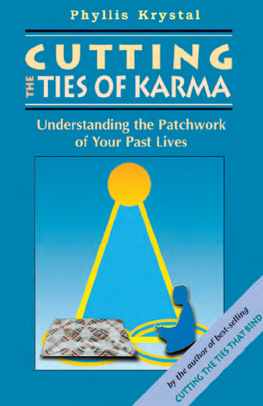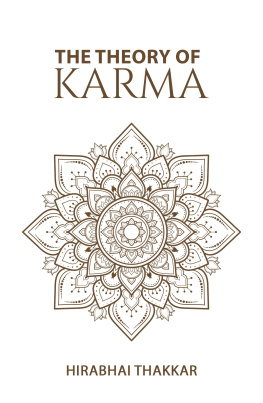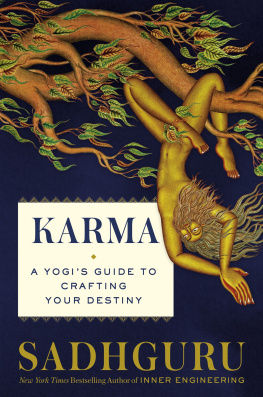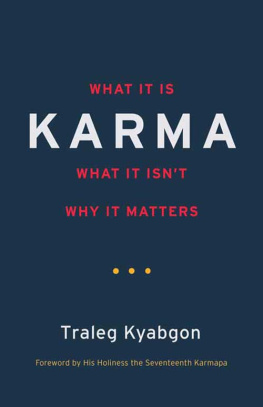
Karma
Happiness in Your Life - Book One: Karma
E-book, 1st edition 2012
Text by Doe Zantamata
eISBN 978-616- 222-109-5
Published by www.booksmango.com
E-mail: info@b ooksmango .com
Text & cover page Copyright Doe Zantamata
No part of this book may be reproduced, copied, stored or transmitted in any form without prior written permission from the publisher.
This ebook is licensed for your personal enjoyment only. It may not be re-sold or given away to other people. If you would like to share this book with another person, please purchase an additional copy for each recipient. If you are reading this book and did not purchase it, or it was not purchased for your use only, then please purchase your own copy. Thank you for respecting the hard work of this author.
***
Overview: What Karma is and What it is Not
The widest known definition of karma is What goes around, comes around, or, what you do and say will come back to you, good or bad. This is actually only one of the twelve laws of karma, The Great Law (As you sow, so shall you reap). People generally use it in reference to someone acting in a really awful or really wonderful way. We let go of some anger towards mean people knowing that their karma will catch up to them. We root for those who always seem to be doing many nice things for others.
However, karma is not a reward and punishment system. Karma has a basis in understanding. If Person A does something good for Person B, they will not suddenly win the lottery. They will, however, be given a situation where they are able to take on the perspective of that person that they did the good thing for. Person Bs karma is also affected, and they will be given a situation where they can choose to take the role that Person A did before. Whether they choose to do something good, or Pay it forward or not, is entirely up to them, but will affect both their karma, and the person they choose to do good for or not.
In this way, karma is a completely connected series of events between ever growing numbers of people. If you wanted to start a business when you were 25, and someone lent you money to do so, this would be an example of an event that may not catch up to you until years later. It may be that your business took off and you were very successful, then at the age of 55, someone approached you with their business idea asking for money to help make it happen. This is your turn to have the perspective of the person who helped you 30 years before. Until that point, you may never have known or even thought about what their thoughts were when youd asked years earlier. At this point, should you choose to lend them money, youve instantly set the course for them to become you in several years time. Should you choose not to help them, they will remember years later that you chose not to when they are approached. They may then choose to do as you did, or to do as the person before you did.
So from the outside, if a person is expecting to see any kind of punishment in this case, they may be disappointed. By not paying it forward though, Person B has not changed anything for Person C. Person C, years later when in that situation, may even be MORE inclined to help a Person D with their business venture, because they KNOW how much of a struggle they endured without help. Or, they may take on an egotistic attitude that they pulled themselves up by their own bootstraps, so why should they help anyone else.
This is not only in business deals, but in all sorts of relationships. Cycles of parents and children go through this in both positive and negative ways. When a child learns from their parent, they believe 100% that this is how things are. They may grow up believing things that just are not true, and then unknowingly pass those things down to their own children. If this is a bad cycle, such as alcoholism or abuse, the adults always have the choice to break the cycle when it comes to their own children.
Breaking a negative cycle will not just affect those children, but all the next generations to come. What you do today can affect people hundreds of years from now, whether or not they even know of your name or that you ever existed. Were much more powerful than most of us realize, and our choices can affect hundreds, if not thousands of people.
Have you ever seen a generational photo? Where one set of great grandparents have all around them their children, grandchildren, great grandchildren? If they had 4 children, and each of those children had 3 children, and each of those children had 2 children, there are now 24 people who are affected by the choices they made and the things they taught to their children. We can see how over hundreds of years of family lineages, there is an ever increasing number of people who pass down teachings just like heirlooms to the next generations.
The start of this is awareness. Once an adult begins to think about beliefs they have, and examine what effects they have on themselves and others, they can begin to correct beliefs and actions that give negative results. Often times, parents will be a little shocked to hear themselves say to their children things they used to hear as children. This is awareness of karma, and it is in these moments that people can reevaluate if those words they are passing on to the next generation are true and good or not.
Good karma increases peoples connectedness and collective good. Bad karma isolates people and results in a more self centered collective.
Those who are Christians have no doubt heard, Do unto others, as youd have done to you. This is also The Great Law of karma, just worded differently. While this statement is generally used to encourage people to be good to others, the other meaning of it is often not realized. It means also to treat yourself as well as youd treat other people. Dont treat yourself worse than youd treat anyone else. When you give and do all the time but never accept when others try to give to you or do for you, youre depriving yourself of good things, and depriving others of being able to feel the great way you do when you give.
Receiving good with gratitude is not selfish at all when in balance with giving with an open heart. Not receiving good can also cause resentment.
For example, if you dont have much money but loan someone money to pay their rent, and then they do not pay you back but go out and buy a new sportscar, chances are youll resent them for that. But it has nothing to do with them. To them, youre a very kind and giving person. They would be shocked to hear any negative comment come from you, and may even ask why you loaned money to them when you didnt have enough for yourself.
Then, what was thought to be good turns out to be a negative experience for both you and that person. This is doing unto yourself less than what you do for others. Eventually, youll wonder why you do so much but have nothing to show for it, when truth is, youve done that to yourself. You wouldnt wish that on any person you care about, so do not treat yourself so poorly.
Keeping the flow of giving and receiving good is essential to building good karma, both for yourself, and for all those you come into contact with, and all those they, in turn, contact.
Lets move on to the 12 Laws of Karma. These Laws have been formed and passed down over thousands of years, and are thought to be of ancient Hindu origin. If you are of one particular religion and are hesitant to read further, there is nothing to fear. Each of the religions makes many hundreds of mentions to these Laws of Karma, even if they do not separate them into any set of Laws or call them by that name. You may be reminded of certain passages from religious scriptures when reading the Laws. Karma is discussed in many religious and spiritual texts, including The Bible, The Quran, Hindu and Buddhist writings. These passages are not copying Hindu texts; they are just another way to communicate the Universal Laws to all people. The Hindus did not make them up either. They were just the earliest known who have documented them.
Next page







